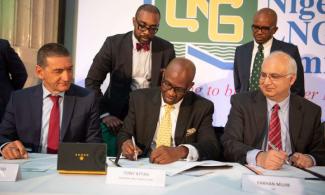
“The SPAs have also been signed before, so already I have existing SPAs for Train-7. It's 22MTPA today and going to 30MTPA, increasing capacity by 35 per cent or more. All of the new capacities have been contracted."

After over 10 years, the Nigerian Liquified Natural Gas (NLNG) LTD is ready to take the final investment decision (FID) on its eight million tonnes per annum gas refining plant, Train seven. This will increase its gas refining capacity from 22 (MTPA) to 30 (mtpa).
Speaking with ThisDay on the sidelines of the company’s loan repayment meeting with shareholders in London, Tony Attah, Managing Director of NLNG, said Sales Purchase Agreements and Gas supply Agreements were already in place to keep the plant in business.
“The SPAs have also been signed before, so already I have existing SPAs for Train-7. It's 22MTPA today and going to 30MTPA, increasing capacity by 35 per cent or more. All of the new capacities have been contracted.
“What is important is that the SPAs have been signed since 2007 and we’ve been rolling them. We need to renew them and in terms of the tenure it is a conversation that has to come.”
While hoping to have a long term agreement of 20 years with its customers, NLNG understands that it has to be flexible:
“Our expectation as the seller is that we are going to ask for a 20-year tenure but we are not unmindful of the changing dynamics in the market; people want it shorter, the word there for us is flexibility and competitiveness.
“What we are really pursuing is not so much the tenure but value, and so we are open to discuss at an appropriate time.”
The NLNG boss said they had successfully repaid the $5.4 billion borrowed from the shareholders to establish its first six plants — Trains one to six. He said his company’s investment drive will not be phased by the 2019 elections, adding that it is all about belief.
“My company has always been about ambition, even when there was nothing, we had no plant or location, the shareholders believed and invested what was $5.4 billion, which we paid off.
“It is about belief, but I understand in terms of sequencing of projects, you do the front-end engineering design, then you have your EPC tenders on the table and take your Final Investment Decision hoping that your EPC remains competitive. Our ambition remains to try and get FID in December but it will depend on when the field is completed practically.”
Attah said the backing for Train-7 is firmly rooted. The company has a balance sheet of $11 billion and total funding for the project is $11.5 billion. He revealed that his shareholders had given go-ahead for Train-7:
“I have Gas Sales Agreements (GSAs) in place because I am a brownfield and so it is not a critical factor in essence because I can improve on what I have and my gas suppliers are in agreement that we go for this, we are jointly working.
“The gas supplier who will supply me gas upstream are investing as well. They are also needing to invest about $5 billion or so to develop the gas that I need for Train-7 while I invest another $6.5 billion to build the train itself.”